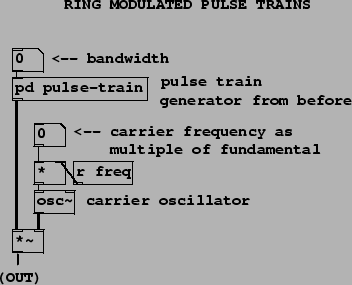 |
The next three examples demonstrate the sound of the varying pulse width, graph its spectrum, and contrast the waveshaping pulse generator. Skipping to Example F05.ring.modulation.pd (Figure 6.14), we show the simplest way of combining the pulse generator with a ring modulating oscillator to make a formant. The pulse train from the previous example is contained in the pd pulse-train subpatch. It is multiplied by an oscillator whose frequency is controlled as a multiple of the fundamental frequency. If the multiple is an integer, a harmonic sound results. No attempt is made to control the relative phases of the components of the pulse train and of the carrier sinusoid.
 |
The next example, F06.packets.pd (Figure 6.15), shows how to
combine the stretched wavetable pulse train with a sampled sinusoid to realize
movable formants, as described in Section 6.3. The pulse
generator is as before, but now the carrier signal is a broken sinusoid.
Since its phase is the fundamental phase times the center frequency quotient,
the sample-to-sample phase increment is the same as for a sinusoid at the
center frequency. However, when the phase wraps around, the carrier phase
jumps to a different place in the cycle, as was illustrated in Figure
6.7.
Although the bandwidth quotient
![]() must be at least
one, the center
frequency quotient
must be at least
one, the center
frequency quotient
![]() may be
as low as zero if desired.
may be
as low as zero if desired.